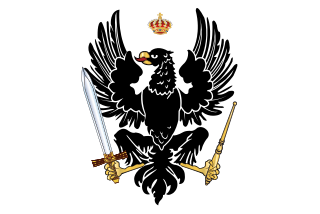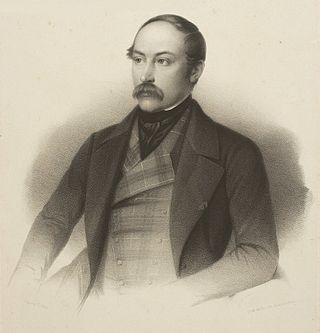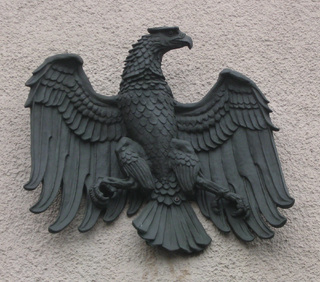
The Kingdom of Prussia constituted the German state of Prussia between 1701 and 1918. It was the driving force behind the unification of Germany in 1866 and was the leading state of the German Empire until its dissolution in 1918. Although it took its name from the region called Prussia, it was based in the Margraviate of Brandenburg. Its capital was Berlin.

Prussia was a German state located on most of the North European Plain, also occupying southern and eastern regions. It formed the German Empire when it united the German states in 1871. It was de facto dissolved by an emergency decree transferring powers of the Prussian government to German Chancellor Franz von Papen in 1932 and de jure by an Allied decree in 1947. For centuries, the House of Hohenzollern ruled Prussia, expanding its size with the Prussian Army. Prussia, with its capital at Königsberg and then, when it became the Kingdom of Prussia in 1701, Berlin, decisively shaped the history of Germany.

A Landtag is generally the legislative assembly or parliament of a federated state or other subnational self-governing entity in German-speaking nations. It is usually a unicameral assembly exercising legislative competence in non-federal matters.

The office of Minister-President, or Prime Minister, of Prussia existed from 1848, when it was formed by King Frederick William IV during the 1848–49 Revolution, until the abolition of Prussia in 1947 by the Allied Control Council.

The Imperial Council was the legislature of the Austrian Empire from 1861 until 1918. It was a bicameral body: the upper house was the House of Lords, and the lower house was the House of Deputies. To become law, bills had to be passed by both houses, signed by the government minister responsible, and then granted royal assent by the Emperor. After having been passed, laws were published in the Reichsgesetzblatt. In addition to the Imperial Council, the fifteen individual crown lands of Cisleithania had their own diets.
The German Progress Party was the first modern political party in Germany, founded by liberal members of the Prussian House of Representatives in 1861 in opposition to Minister President Otto von Bismarck.

The Kingdom of Bavaria was a German state that succeeded the former Electorate of Bavaria in 1806 and continued to exist until 1918. With the unification of Germany into the German Empire in 1871, the kingdom became a federated state of the new empire and was second in size, power, and wealth only to the leading state, the Kingdom of Prussia.

The Abgeordnetenhaus of Berlin is the state parliament (Landtag) of Berlin, Germany according to the city-state's constitution. In 1993 the parliament moved from Rathaus Schöneberg to its present house on Niederkirchnerstraße in Mitte, which until 1934 was the seat of the Prussian Landtag. The current president of the parliament is Cornelia Seibeld (CDU).

The Prussian House of Lords in Berlin was the upper house of the Landtag of Prussia, the parliament of Prussia from 1850 to 1918. Together with the lower house, the House of Representatives, it formed the Prussian bicameral legislature. The building is now used as the seat of the German Bundesrat.

Adolf Heinrich Graf von Arnim-Boitzenburg was a German statesman. He served as the first Minister-President of Prussia for ten days during the Revolution of 1848.

Maximilian (Max) Franz August von Forckenbeck was a German lawyer and liberal politician who served as Mayor of Berlin from 1878 until his death. His is considered one of the most important mayors of the city because of his prudent governing style during Berlin's rise as the capital of a unified Germany.

Rudolf Ludwig Cäsar von Auerswald was a German official who served as Prime Minister of Prussia during the Revolution of 1848. Later, during the ministry of Charles Anthony, Prince of Hohenzollern, he led the government in all but name.
The Prussian estates were representative bodies of Prussia, first created by the Monastic state of Teutonic Prussia in the 14th century but later becoming a devolved legislature for Royal Prussia within the Kingdom of Poland. They were at first composed of officials of six big cities of the region; Braunsberg (Braniewo), Culm (Chełmno), Elbing (Elbląg), Danzig (Gdańsk), Königsberg (Królewiec) and Thorn (Toruń). Later, representatives of other towns as well as nobility were also included. The estates met on average four times per year, and discussed issues such as commerce and foreign relations.
House of Representatives is the name of legislative bodies in many countries and sub-national entities. In many countries, the House of Representatives is the lower house of a bicameral legislature, with the corresponding upper house often called a "Senate". In some countries, the House of Representatives is the sole chamber of a unicameral legislature.

The chancellor of Germany, officially the federal chancellor of the Federal Republic of Germany, is the head of the federal government of Germany, and the commander-in-chief of the German Armed Forces during wartime. The chancellor is the chief executive of the Federal Cabinet and heads the executive branch. The chancellor is elected by the Bundestag on the proposal of the federal president and without debate.

The Prussian House of Representatives was the lower chamber of the Landtag of Prussia, the parliament of Prussia from 1850 to 1918. Together with the upper house, the House of Lords, it formed the Prussian bicameral legislature. The Prussian House of Representatives was established by the Prussian constitution of 5 December 1848, with members elected according to the three-class franchise. At first it was called simply the "Second Chamber," with the name "House of Representatives" introduced in 1855.

The Prussian State Council was the second chamber of the bicameral legislature of the Free State of Prussia between 1921 and 1933; the first chamber was the Prussian Landtag. The members of the State Council were elected by the provincial parliaments and gave the provinces of Prussia a voice in the legislative process. The Council had an indirect right to introduce legislation, could object to bills passed by the Reichstag and had to approve expenditures that exceeded the budget.

The 1848 Constitution of Prussia was imposed on the Kingdom of Prussia by King Frederick William IV on 5 December 1848 in response to demands that arose during the German revolutions of 1848–1849. Although the Constitution was not the result of an agreement between the King and the Prussian National Assembly as originally intended, it included a list of fundamental rights, the introduction of jury courts, limitations on the monarch's powers and a mandate to ensure legal certainty.

The Prussian Constitution of 1920 formed the legal framework for the Free State of Prussia, a constituent state of the Weimar Republic, from 1918 to 1947. It was based on democratic parliamentary principles and replaced the Constitution of 1848/50. During the National Socialist era, it was eroded to the point of irrelevance and following World War II lost legal force when the state of Prussia was abolished by the Allies in 1947.

Karl Gisbert Friedrich Freiherr von Vincke was a Prussian officer and politician.























